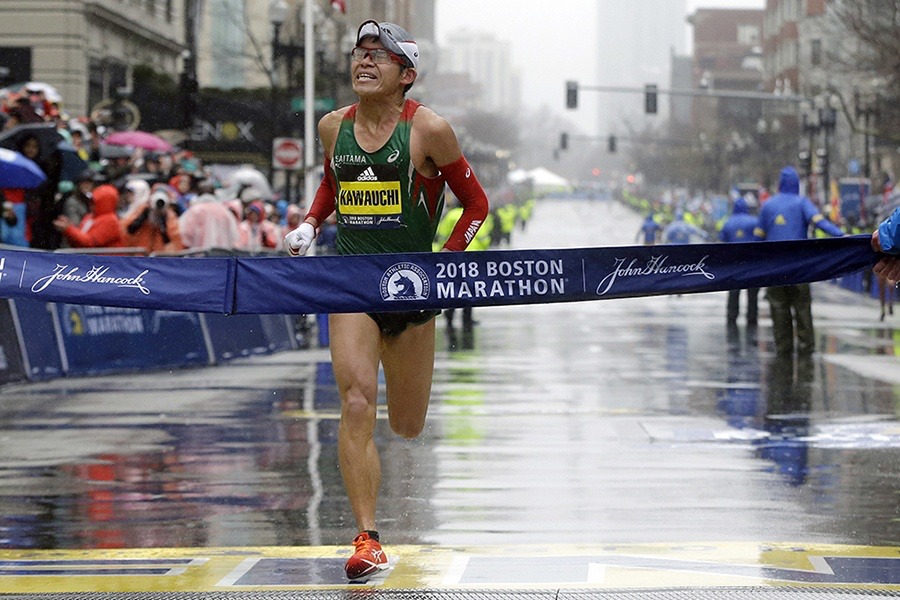How the Rainy Weather Forecast Will Impact the 2019 Boston Marathon
Crummy conditions will change start times for the race.

Elite Men’s winner Yuki Kawauchi of Japan during the 2018 Boston Marathon | Photo via Elise Amendola/AP
When the weather is mild—slightly overcast, maybe, with a cool breeze—the Boston Marathon is a delight. Runners thrive on it, spectators love it, and the feat of endurance that is jogging for 26.2 miles is made a bit more manageable for the tens of thousands who do it every year.
Then, there are years like 2019.
For the second year in a row, crummy weather conditions forecast for Marathon Monday have already put a damper on the big race.
According to the National Weather Service Boston, runners have about a 90 percent chance of getting soaked with rain this year. Temperatures will also be relatively chilly, with lows to start the morning in the upper-40s and highs in the mid-60s, meteorologist Alan Simpson tells me. Thunderstorms are also a possibility.
That is somewhat of an improvement over last year, when amid downpours the lows where in the mid-30s and highs crept only into the mid-50s.
But it still won’t be ideal conditions. Already, the Boston Athletic Association has announced a slate of changes to the race to adapt to the weather.
The @BAA has provided the following information in regards to the expected weather conditions during the Boston Marathon on April 15. This includes updates to start times and advice to all entrants heading into Monday’s race. To learn more, visit: https://t.co/XmTzjQuzTl pic.twitter.com/d20cmJcz5w
— Boston Marathon (@bostonmarathon) April 12, 2019
To make sure athletes don’t spend too much time shivering at the starting line in Hopkinton, start times will be squished more closely together. The fourth wave of runners will set out right after the third wave, the BAA said in a release. Typically there is a 25 minute gap between the waves.
Some other changes to expect this year, according to the BAA’s advisory:
- Adjustments to staging areas to ensure weather readiness, including tent walls, additional heat, and flooring.
- Additional accommodations for potential overflow of medical aid stations along the course.
- For volunteers along the course, additional ponchos and hand warmers will be distributed.
- Enhanced gear check area to prevent long wait times when retrieving gear bags.
Certain athletes, including those who use wheelchairs, handcycles, or prosthesis, will also be allowed to defer participation to 2020 if they are worried about the slick conditions, and will be able to do so without having to re-qualify for next year’s race.
Last year some 2,500 runners sought medical attention for hypothermia and other maladies linked to the perilous cold.
“It is crucial that athletes take seriously the weather forecast and prepare appropriately for all conditions,” the organization says, adding, “The B.A.A. will continue to update participants of changes in procedures and best practices for a safe and successful Boston Marathon experience. We continue to encourage participants to use their best judgement in preparing for and participating in the Boston Marathon.”

